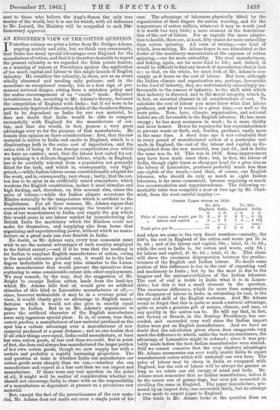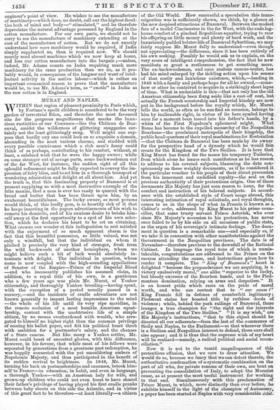AN ENGINEER'S VIEW OF THE COTTON QUESTION.
IN another column we print a letter from Mr. Bridges Adams, arguing acutely and ably, but we think very erroneously, that India has many special advantages over England for the manufacture of cotton, and that it is therefore desirable to regard the present calamity as we regarded the Irish potato famine, as a warning of nature or Providence against the application of too much capital and labour to this single branch of English industry. He considers the calamity, in short, not as an event wholly abnormal and needing only patience and in the meantime an exceptional remedy, but as a first sign of per- manent national danger, arising from a mistaken policy and the undue encouragement of an " exotic " trade. Superior inventiveness has, according to Mr. Adams's theory, favoured the competition of England with India ; but if we were to be permanently deprived of the cotton fields of the Southern States, and to be dependent on India for our raw material, he does not doubt that India would be able to compete successfully with England for the manufacture of cot- ton, and that she would, in fact, possess a very great advantage over us for the purpose of that manufacture. lie founds this opinion on three considerations : first, that the raw material is native to India and exotic in England, which is a disadvantage both in the extra cost of importation, and the extra risk of losing it from foreign complications over which we have no control ; next, that the labour best suited for cot- ton spinning is a delicate-fingered labour, which, in England, has to be carefully selected from a population not generally fitted for the task, and which is, consequently, very, high- priced,—while Indian labour seems constitutionally adapted for the work, and is, consequently, very cheap ; lastly, that the cot- ton has to be spun in an artificially raised atmosphere, which weakens the English constitution, makes it need stimulus and high feeding, and, therefore, on this account also, raises the price of labour,—while the Indian climate accustoms the Ilindoo naturally to the temperature which is artificial to the Englishman. For all these reasons, Mr. Adams argues that economists would do well to encourage the transfer of a por- tion of our manufactures to India, and supply the gap which this would cause in our labour market by manufacturing for British India the machinery which the Hindoos could not make for themselves, and supplying also from home that organizing and superintending power, without which no manu- facture on a great scale can ever flourish in India.
No doubt, as Mr. Adams says, every true economist must wish to see the natural advantages of each country employed to the fullest extent ;—and if it be true that the tendency is for Indian to supplant English manufactures of cotton, owing to the special resources pointed out, it would be to the last degree undesirable to give any false stimulus to the Lanca- shire manufacturer that would prevent the operatives from scattering to some considerable extent into other employments. We may remark, by the way, that the suggestion of Mr. Bright to exempt Indian cotton lands from the land-tax which Mr. Adams falls foul of, would give no artificial stimulus of this kind to Lancashire manufactures at all;— since, however undesirable it may be in a revenue point of view, it would clearly give no advantage to.English manu- factures which it would not also give in exactly equal degree to Indian. But to us Mr. Adams's arguments to prove the artificial character of the English manufacture seem only ingenious special pleas. It is, of course, true that, cesteris paribus, a manufacturer of raw material produced on the spot has a certain advantage over a manufacturer of raw material produced at a great distance ; and no one doubts that if all other things were equal, India could manufacture, at least her own cotton goods, at less cost than we could. But in point of fact, she does and always has manufactured the larger portion of her own cotton goods, though we now supply her with a certain and probably a rapidly increasing proportion. The real question at issue is whether India can manufacture our cotton goods more cheaply than we can,—whether she can manufacture and export at a less cost than we can import and manufacture. If there were any real question on the point at all, it might well be matter of consideration whether we should not encourage India to share with us the responsibility of a manufacture so dependent at present on a precarious raw material.
But, except the feet of the precariousness of the raw mate- rial, Mr. Adams does not make out even a single point of his
case. The advantage of labourers physically fitted by tho organization of their fingers for cotton weaving, and for the temperature of cotton mills is, whatever it may be worth (and it is worth but very little) a mere element in the determina- tion of the cost of labour. For as regards the mere adapta- tion to health, there are, at least, fifty trades far more unhealthy than cotton spinning. All sorts of mining,—one kind of which, iron-mining, Mr. Adams hopes to see stimulated as the feeder of the machinery-manufacture at the expense of cotton spinning,—are far more unhealthy. The steel manufactures, and baking, again, are far more fatal to life ; and, indeed, it would be difficult to find any branch of manufacture that is less so ; so that, on the whole, we must look at Mr. Adams's case simply as it bears on the cost of labour. But here, although the Indian climate and organization are, perhaps favourable to the kind of industry, they are unfortunately exceedingly un- favourable to the amount of industry, to the skill with which that industry is directed, and to the moral integrity which is, in fact, an essential element in all considerations of cost. To calculate the cost of labour you must know what that labour produces, and what it wastes in a given time,—as well as its mere price. Now, here, climate, organization, and national habits are all favourable to the English labourer. He has more energy; he has more acuteness in work ; he is more thrifty and more honest. Hence he requires far less superintendence to prevent waste or theft, and, besides, produces vastly more in the same time. A short time ago it was calculated that in every pound of manufactured cotton of a particular sort made in England, the cost of the labour and capital, as dis- tinguished from the raw material, was just 5d., and in India the same was 3s. 4d. This was in 18.58. Some improvement may have been made since then ; but, in fact, the labour of India though eight times as cheap per bead for a given time as the labour of Lancashire, produces probably much less than one-eighth of the result,—and then, of course, one English labourer, who should do only as much as eight Indian labourers, is far more economical, because requiring so much less accommodation and superintendence. The following re- markable table was compiled a year or two ago by Mr. Chad- wick, from the most careful inquiry :— Correa Yaws wowing is 1858.
No. 40's. England. India.
d. s.d. No. 80'3.
England. India.
3. d. s. EL Price of cotton and waste per lb. 6 ... 0 8 0 9 ... 0 4} labour and capital „ „ 5 ... 8 4 1 8 ... 8 10i
—
—
— -- Total price per lb
ll 8 7 2 0 9 3 And when we come to the very finest numbers—namely, the 250's, the coat in England of the cotton and waste per lb. is 3s. 6.5.; and of the labour and capital, 18s. ; total, 1/. ls. 6d., while the cost in India is, for cotton and waste, only 8.5.; for labour and capital, 41. 38. 4d. ; total, 4/. 48. This alone will show the enormous disproportion between the produc- tiveness of the English and Indian labour. No doubt some portion of this difference is due to the cost of exporting coal and machinery to India ; but by far the most is due to the languor and the untrustworthiness of the Indian labourer. The cost of coal is treble in India what it is in Lanca- shire; but. this is but a small element in the question. The enormous difference, which far more than compensates the cheapness of labour in India in estimating its cost, is the energy and skill of the English workman. And Mr. Adams seems to forget that this is quite as much a natural advantage, quite as much a genuine gilt of nature, climate, and race, as any quality in the cotton can be. He will say that, in fact, one factory at Broach, in the Bombay Presidency, has suc- ceeded, and succeeded very well since the Indian import duties were put on English manufactures. And we have no doubt that the calculation given above does exaggerate very much the difference to which, under the best circumstances, the advantage of Lancashire might be reduced ; since it was pro- bably made before the best Indian manufactories were started. Still we cannot conceive that the very shadowy advantages Mr. Adams enumerates can ever really enable India to export manufactured cotton which will undersell our own here. The price of labour may be cheap in India as compared with England, but the cost of labour will be always far greater so long as we retain our old energy of mind and body. Mr. Adams must remember that no Indian manufacture, unless it be the coarse one of gunny-bags, has ever yet succeeded in rivalling the same in England. The paper manufacture, pro- tected by an import duty, has succeeded fairly, but no attempt is ever made to export paper to England. The truth is Mr. Adams looks at the question from an
engineer's point of view. He wishes to Bee the manufacture of machinery—which does, no doubt, call out the highest facul- ties both of mind and body—" stimulated," and he therefore depreciates the natural advantage possessed by England in the cotton manufacture. For our own parts, we should not be sorry to see the manufacture of machinery extending at the cost of the manufacture of cotton. But we do not exactly understand how more machinery would be required, if India simply supplanted us, than is required now. We should merely send abroad machines which we now keep at home, and lose our cotton manufacture into the bargain ;—unless, indeed, Mr. Adams counts on India requiring much more machinery for the same production than we do, as it pro- bably would, in consequence of the languor and want of intel- lectual activity in the native labour—which is rather an important economical reason to prove that the manufacture would be, to use Mr. Adams's term, as "exotic" in India as the raw cotton is in England.































 Previous page
Previous page